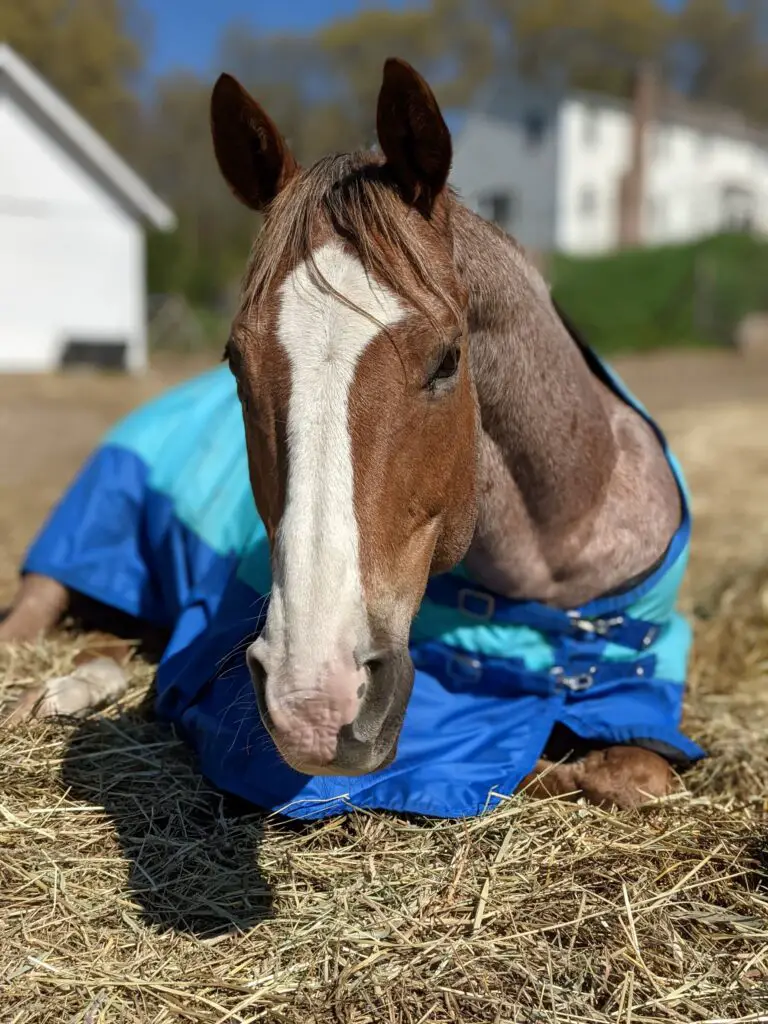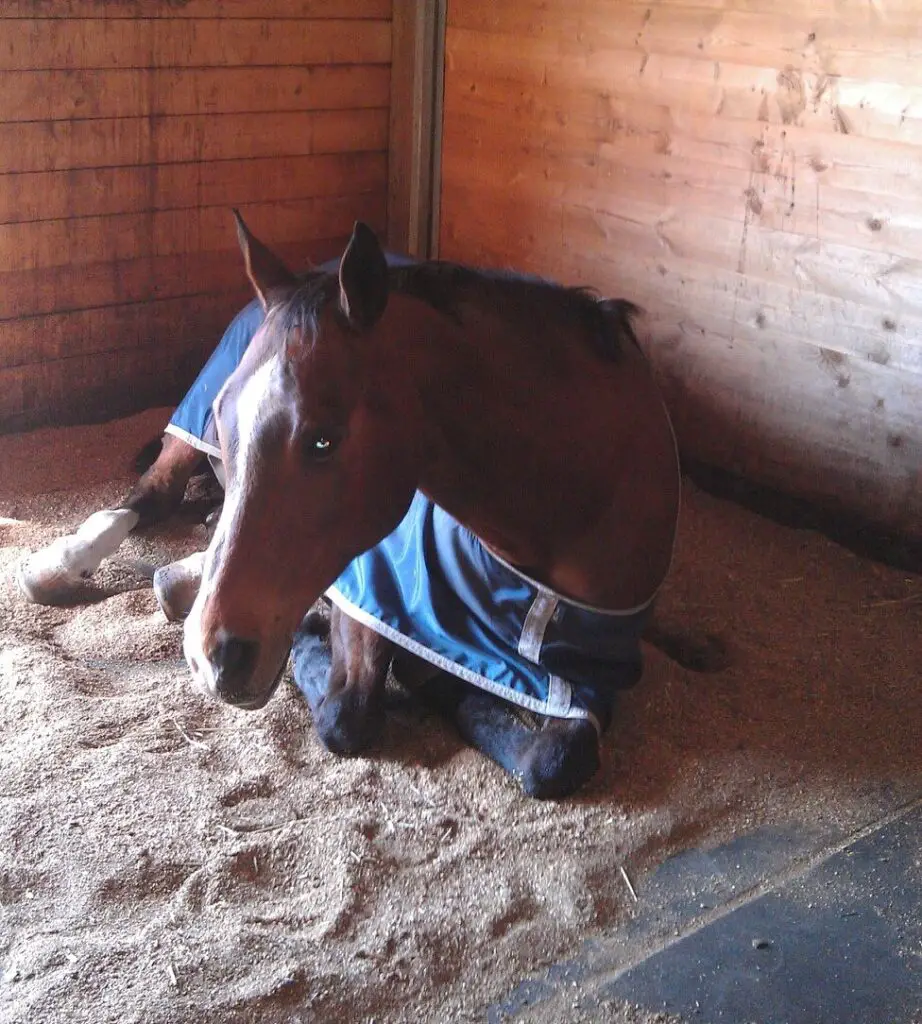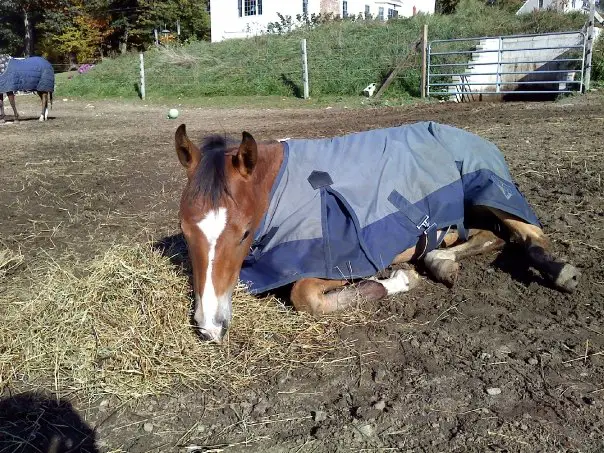Ever wondered how much shut eye your horse really needs? Have you seen a horse lying down and thought they were sick? There are a lot of common misconceptions about horses and sleep. So, how much do horses sleep at night?
On average horses sleep about 2 to 3 hours per day. They need a minimum of 30 minutes of REM sleep per day which may be achieved in short spurts of time and only while lying down. Horses also tend to snooze while standing on and off throughout the day when they’re not grazing, so in total they get about 5 to 7 hours of rest per day.
In this article we’ll explore what really happens after you tuck your horse in for the night.
Why Do Horses Sleep So Little?
There are several reasons horses sleep less than humans. Since horses are prey animals they have to be alert and can only rest for short periods. They also need to be able to wake up quickly and be on the move should a threat arise. Horses also need to feel they are safe and in a secure environment in order to get quality sleep. This may include napping outside in the sun with their paddock buddies.
If you’ve spent much time in barns or live in a rural area where you have the luxury of driving by horse farms you’ve probably noticed this. Typically, you’ll see many horses napping all at once while one or two stand guard to protect them. Then the horses rotate so that all of the horses can rest. Lastly, since horses only get a couple of hours of sleep in a 24 hour period, they spend a large portion of the day resting. Of course there is time for exercise (with their humans) and play with their buddies but they mostly rotate between eating, resting and sleeping.

Do Horses Sleep Standing Up Or Lying Down?
Horses sleep both standing up and lying down! Horses have a unique feature that allows them to lock their knees in their front legs while resting one hind leg called the stay apparatus. The stay apparatus allows them to snooze while they’re standing up without falling! This unique skill is crucial to a horse’s survival.
The ability to fall asleep while standing up allows horses to flee from danger if necessary. Horse’s cannot get up quickly and easily to escape a threat so being able to rest while standing as a prey animal is a huge benefit.
Contrary to popular belief, horses do in fact lay down! In order to achieve REM sleep a horse must be laying down. While the amount of time they lay down to sleep is relatively short, it’s very important for them to have the opportunity.
How Long Horses Can Sleep Lying Down
Typically a horse will lay down for 2 to 3 hours per day but not necessarily consecutively. Due to the size of most horses, they cannot lay down for long periods of time as this can restrict blood flow to their organs. Horses continue to rotate between sleeping, eating and resting throughout the night and my lay down on and off.
Types Of Sleep
Horses experience different types of sleep just like people. The first type is called Slow Wave Sleep or SWS and makes up for about 65% of the horse’s sleep according to equitationscience.com. During this time horses can fall into a deep non-REM sleep.
The second type of sleep horses experience is Rapid Eye Movement or REM sleep. Studies have shown that REM sleep takes place for about 30 minutes per night and makes up for about 15% of sleep time.
When a horse is not in Slow Wave or REM sleep they are experiencing light sleep. Horses can experience both light and Slow Wave sleep while standing.

The Affects Of Sleep Deprivation
While horses may not need quite as much sleep as humans, they still require REM sleep to function. It may take days or even a week for the horse to feel an impact but the results can be dangerous. A REM sleep deficiency can cause a horse to doze too deeply and fall into REM while standing. This can cause their knees to buckle and the horse to fall. These collapses can cause serious injury to the horse including head injuries, hock, neck, fetlock injuries etc. Sleep deprivation can also cause behavioral changes as well.
Factors That Can Prevent Sleep
Studies have shown that horses that are not provided adequate space to lay down may not have the ability to achieve REM sleep. Whether the stall is too small or a shed or paddock is being shared with other horses. If other horses in the herd act aggressively towards a horse who cannot find space to move far enough away, he may become sleep deprived.
Other horses have experienced difficulty lying down due to physical pain. For example, horses with arthritis or chronic lameness problems who find it difficult to lay down and get back up may not lay down. Additionally, horses that do not have access to a dry bedded area and only have hard mats or a turnout area may be less likely to lay down.
Lastly, some horses are hesitant to lay down if they feel unsafe or insecure in their environment. Horses that feel isolated in a stall rather than turned out with their pasture mates for example. Or, horses that are kept outside that may hear noises from wild animals, storms etc.
I hope you’ve found this article helpful!
Check Out Other Horse Care Articles Here!
Daily Grooming Routine Your Horse Will Love!

